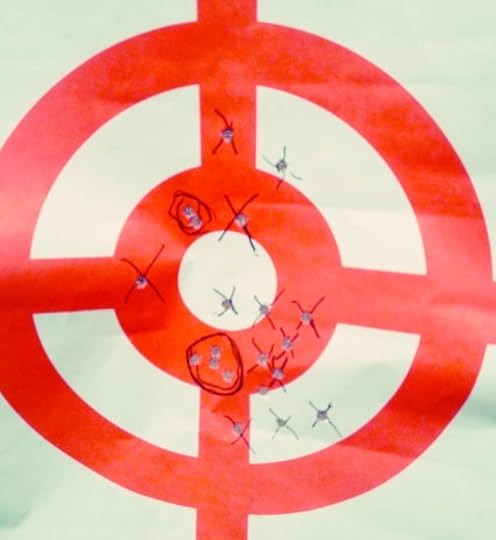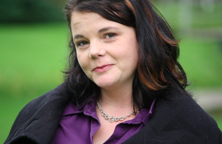Are Details in Your Fiction Missing the Mark?–A Simple Tool to Take Our Fiction to a New Level

Are your details on target?
Today, I’m letting Lisa Hall-Wilson guest post again for me, because she has a really wonderful lesson to share. Few things can pull a reader out of a story like us—the writer—bungling the details. I know I once tossed a book in a drawer because the heroine put “the safety on” a revolver.
It annoyed me.
It was a small but important detail the author could have gotten right had she done a little homework and asked the right people some simple questions. And, since the rest of her story involved action and guns and my husband is on a military shooting team, I assumed the rest of the story would probably just have me yelling, “WTH? NO!”

NOT a revolver.
Details can make or break a story, but what can we do to make sure we are getting our facts straight? Lisa is here to help.
Take it away, Lisa!

Lisa Hall-Wilson
Getting Details Wrong Annoys Readers!
One of the most overlooked items in a writer’s toolbox is conducting interviews. Doesn’t matter whether you’re writing fiction, non-fiction, articles, novels or blogging, being able to ask for and run a successful interview is an essential skill.
We don’t have to be that pushy reporter shoving a hand-held recorder in people’s faces. Being polite and professional will go a long way. I wrote a post over at the BookShelf Muse on how to ask for an interview so make sure you check that out.
Sure, sure – I get how interviews are important for journalists. But I write fiction.
OK – do you have a professional in your novel, the protagonist say, who has a job you’ve never done? One novelist wrote a series of novels about a group of adopted siblings: one was a hostage negotiator, another a fireman, another a cop, another a pediatrician, another a crime scene investigator. Do you really think this author had worked all those jobs? How did she know so much about each one?
She interviewed people!
We can’t learn everything from Google or a book. We can’t. We need anecdotes, first-person been there stories, someone to debunk the Hollywood stereotypes. Nothing pulls you in like the tiny details unique to that profession or situation, and nothing is more annoying than when an author gets those details wrong.
We want to get it right, and that means talking to people who have actually done that job!
You don’t get it. I’m a writer. I spend half the day working up the courage to tweet or post a status on Facebook. I can’t interview anyone.
That attitude isn’t going to cut it. Chin up – pen out. This is part of the job. Successful novelists interview people when researching a novel. Whether they’re researching a profession, or need advice on a particular scene, readers trust you (the author) to get the details right.
If you’re fortunate, you’ll have friends, friends of friends, family, or acquaintances you can reach out to. Certainly, even as a journalist, my job is a lot easier when I can pick from the low-hanging fruit as it were. Those I already know or have access to.
Interviewing is a skill we can learn. The first couple of times may be intimidating, but being prepared goes a long way. Running a good interview doesn’t require talent as much as it requires practice, preparation, and dose of courage.
As a freelance journalist, I’ve interviewed best-selling authors, JUNO-winning musicians, comedians, drug addicts, a celebrity fashion designer, former prostitutes, police officers, firefighters, pastors, and people with a great story to tell. The one thing all these sources had in common was a desire to make sure I got the details right.
“Fiction is the truth inside the lie.” Stephen King
I have a romantic suspense novel collecting dust on a shelf. In one scene I needed to set a fire in an old farmhouse to trap my two protagonists in the upper storey, but I needed the arsonist to get away clean and there couldn’t be any proof it was arson. So, what did I do?
I interviewed a firefighter.
Now, the key to these interviews is to present the source (the interviewee) with the planned scenario – like the one above. This way you get the benefit of their experience. You put too many filters on the situation and they’ll just tell you what you want to hear instead of what will make the scene pop with realism. He gave me an incredibly creative answer I couldn’t have come up with in a million years – whereas – he’d seen it done.
He also let me feel his hands. Hey – don’t laugh. I was working on a romance novel where the main protagonist was a firefighter. In a romance novel the feel of a man’s hands is an important detail. I imagined a fireman’s hands would be rough from hauling hoses and swinging axes, etc. But nope – they were very smooth, like a mechanic’s hand. The details make such a huge difference!
And… I’ve never been back to that fire hall. LOL
Have you interviewed someone for your novel, or your blog? What’s the most intimidating part of asking for an interview? Trying to figure out who to ask, or how to ask, I’ll hang around all day to answer questions.
***
I hope this post was super helpful for you. I know that many experts are eager to help writers get the facts straight. I’ve been working with a P.I. who was formerly undercover for the ATF for the details on my novel. It can surprise you how many professionals are willing to assist if you just ask.
Need more help? Lisa is offering some upcoming classes and she is an AMAZING instructor, so I hope you take advantage of these courses you can take from the comfort of HOME.
How To Get Them Talking: Learn To Interview Like A Journalist
Whether you’re writing fiction, non-fiction, articles, or blogging, take your writing to the next level by interviewing experts, professionals, or people who have already been there and done that. Learn from a journalist on how to get the interview, craft questions, get a source talking, how to ask the hard questions without offending, and best practices. This online course is June 20th at 7:30PM-9PM EST. $30
Steering Through The Winds of Facebook Change
A course requested by my writer friends. In two 90minute live webinars learn what your Facebook page can and can’t do for you, and best practices to grow your platform the WANA way to endure almost any change Zuck dreams up. We’ll cover the 12 areas every page owner should focus on, best practices for driving traffic to your website and for better edge rank, and receive a list of resources to help you when you’re on your own. This class is June 15th and 22nd – $60. Get 20% off this class with the code “Lisa20”





